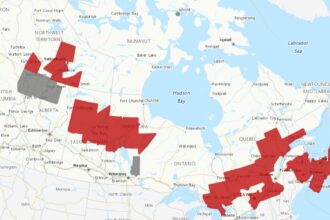In a concerning development for Toronto diners, city health inspectors identified several establishments with significant food safety violations this week, raising questions about the consistency of sanitation practices across the metropolis. As someone who has covered urban health issues for over a decade, these periodic reports serve as critical public health notifications that can prevent potential illness outbreaks.
Municipal health inspectors conducted their routine sweeps across Toronto’s diverse culinary landscape, flagging multiple establishments for infractions that range from improper food temperature control to pest infestations. At Hakka Legend on Shephard Avenue East, inspectors discovered food items stored at potentially hazardous temperatures, a critical violation that can accelerate bacterial growth and increase foodborne illness risks.
Perhaps most alarming was the situation at 168 Sushi Asian Buffet Bar on York Mills Road, where inspectors identified a pest infestation alongside inadequate pest control measures. “Pest control violations represent some of our most serious concerns,” noted Dr. Helena Richards, a public health specialist with whom I’ve consulted on previous food safety investigations. “These situations don’t develop overnight and often indicate systemic problems with establishment management practices.”
Food temperature control emerged as a recurring issue in this week’s inspections. At Congee Wong on Steeles Avenue East, inspectors cited the establishment for failing to maintain proper refrigeration temperatures—a fundamental requirement for preventing dangerous bacterial proliferation in perishable items.
The violations weren’t limited to standalone restaurants. The food service area at Sunny Supermarket on Gerrard Street East received citations for inadequate sanitization of food contact surfaces and equipment, raising questions about cross-contamination risks. According to Canada News, such violations in grocery settings can potentially affect more consumers than restaurant infractions due to higher daily customer volumes.
Toronto’s DineSafe program maintains rigorous standards that align with provincial health guidelines. When establishments fail inspections, they typically receive yellow (conditional pass) or red (closed) cards that must be prominently displayed. All establishments mentioned in this report received conditional passes and will undergo follow-up inspections to ensure compliance with remediation orders.
Industry data analyzed by CO24 News shows that approximately 3% of Toronto food establishments face conditional passes each month, with about 0.5% receiving closure orders—statistics that have remained relatively stable over the past five years despite the pandemic’s disruptions to the restaurant industry.
“What consumers should understand is that these inspection reports represent a snapshot in time,” explains James Morrison, former restaurant compliance officer and current food safety consultant. “While concerning, many establishments quickly address violations and implement stronger preventative measures following inspections.”
For Toronto residents concerned about dining safety, the city maintains a searchable database of inspection results at DineSafe Toronto, allowing consumers to review an establishment’s compliance history before making dining decisions. Health experts recommend reviewing recent inspection results, observing visible cleanliness indicators, and reporting concerns to Toronto Public Health.
As we navigate post-pandemic dining with heightened awareness of public health considerations, these inspection reports offer transparency into an essential aspect of urban life. With summer approaching and dining activity increasing across the city, will these recent violations prompt stricter adherence to food safety protocols, or simply represent routine fluctuations in Toronto’s complex food service ecosystem?










